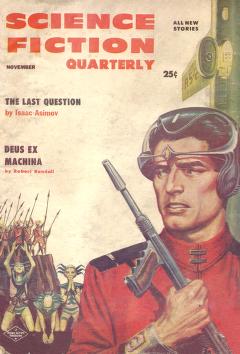- “The Last Question” is a science fiction short story by American writer Isaac Asimov. It first appeared in the November 1956 issue of Science Fiction Quarterly and in the anthologies in the collections Nine Tomorrows (1959), The Best of Isaac Asimov (1973), Robot Dreams (1986), The Best Science Fiction of Isaac Asimov (1986), the retrospective Opus 100 (1969), and in Isaac Asimov: The Complete Stories, Vol. 1 (1990). While he also considered it one of his best works, “The Last Question” was Asimov’s favorite short story of his own authorship, and is one of a loosely connected series of stories concerning a fictional computer called Multivac. Through successive generations, humanity questions Multivac on the subject of entropy. The story overlaps science fiction, theology, and philosophy.
 Science Fiction Quarterly, November 1956 cover
Science Fiction Quarterly, November 1956 cover